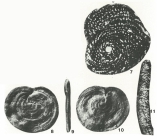Foraminifera taxon details
Anchispirocyclina Jordan & Applin, 1952 †
739331 (urn:lsid:marinespecies.org:taxname:739331)
accepted
Genus
Anchispirocyclina henbesti Jordan & Applin, 1952 † accepted as Anchispirocyclina lusitanica (Egger, 1902) † (type by original designation)
Iberina Munier-Chalmas, 1902 † · unaccepted (Junior homonym of Iberina Simon, 1881)
- Species Anchispirocyclina lusitanica (Egger, 1902) †
- Species Anchispirocyclina neumannae Bernier, Fleury & Ramalho, 1979 †
- Species Anchispirocyclina praelusitanica (Maync, 1964) †
- Species Anchispirocyclina henbesti Jordan & Applin, 1952 † accepted as Anchispirocyclina lusitanica (Egger, 1902) † (Subjective junior synonym in opinion of Loeblich and Tappan (1987))
marine, brackish, fresh, terrestrial
fossil only
feminine
Jordan, L., and E. R. Applin, 1952, Choffatella in the Gulf Coastal regions of the United States and description of Anchispirocyclina n. gen., Contributions from the Cushman Foundation for Foraminiferal Research 3:1-5. , available online at https://cushmanfoundation.allenpress.com/portals/_default/files/pubarchive/CCFFR/03ccffr1.pdf
page(s): p. 3 [details] Available for editors [request]
[request]
page(s): p. 3 [details] Available for editors
Diagnosis Test enrolled, planispiral to slightly asymmetrical, large flattened and commonly slightly undulating discoid microspheric...
Diagnosis Test enrolled, planispiral to slightly asymmetrical, large flattened and commonly slightly undulating discoid microspheric tests, early stage close coiled, later flaring, spreading, and peneropline to reniform or circular in outline, chambers broad, low, strongly arcuate in the early stage, later may become completely cyclic, periphery rounded to subacute; wall microgranular to finely agglutinated or may include occasional large grains or tests of smaller foraminifers, imperforate outer layer underlain by a reticulate choffatelloid subepidermal network of rafters and beams, the narrow chambers not subdivided inward from the reticulate zone but leave a narrow open canal into which the septal apertures open, chambers near the median plane occupied by an irregular labyrinthic structure produced by radial pillars or buttresses arising between adjacent apertural passages, and extending from septum to septum, buttresses of successive chambers radially aligned; aperture cribrate, scattered over the apertural face. U. Jurassic (L. Kimmeridgian) to L. Cretaceous (L. Valanginian); Spain; Portugal; France; Switzerland; Yugoslavia; Algeria; Morocco; Turkey; Atlantic: Cape Verde Islands; USA: North Carolina; Cuba. (Loeblich & Tappan, 1987, Foraminiferal Genera and Their Classification) [details]
Hayward, B.W.; Le Coze, F.; Vachard, D.; Gross, O. (2025). World Foraminifera Database. Anchispirocyclina Jordan & Applin, 1952 †. Accessed at: https://www.marinespecies.org/foraminifera/aphia.php?p=taxdetails&id=739331 on 2025-05-28
Date
action
by
original description
Jordan, L., and E. R. Applin, 1952, Choffatella in the Gulf Coastal regions of the United States and description of Anchispirocyclina n. gen., Contributions from the Cushman Foundation for Foraminiferal Research 3:1-5. , available online at https://cushmanfoundation.allenpress.com/portals/_default/files/pubarchive/CCFFR/03ccffr1.pdf
page(s): p. 3 [details] Available for editors [request]
[request]
original description (of Iberina Munier-Chalmas, 1902 †) Munier-Chalmas, E. (1902). Sur les Foraminifères ayant un réseau de mailles polygonales. <em>Bulletin de la Société géologique de France.</em> (4) 2 (3): 349-351., available online at https://biodiversitylibrary.org/page/30750130
page(s): p. 350 [details]
page(s): p. 3 [details] Available for editors
original description (of Iberina Munier-Chalmas, 1902 †) Munier-Chalmas, E. (1902). Sur les Foraminifères ayant un réseau de mailles polygonales. <em>Bulletin de la Société géologique de France.</em> (4) 2 (3): 349-351., available online at https://biodiversitylibrary.org/page/30750130
page(s): p. 350 [details]
 Present
Present  Inaccurate
Inaccurate  Introduced: alien
Introduced: alien  Containing type locality
Containing type locality
From editor or global species database
Diagnosis Test enrolled, planispiral to slightly asymmetrical, large flattened and commonly slightly undulating discoid microspheric tests, early stage close coiled, later flaring, spreading, and peneropline to reniform or circular in outline, chambers broad, low, strongly arcuate in the early stage, later may become completely cyclic, periphery rounded to subacute; wall microgranular to finely agglutinated or may include occasional large grains or tests of smaller foraminifers, imperforate outer layer underlain by a reticulate choffatelloid subepidermal network of rafters and beams, the narrow chambers not subdivided inward from the reticulate zone but leave a narrow open canal into which the septal apertures open, chambers near the median plane occupied by an irregular labyrinthic structure produced by radial pillars or buttresses arising between adjacent apertural passages, and extending from septum to septum, buttresses of successive chambers radially aligned; aperture cribrate, scattered over the apertural face. U. Jurassic (L. Kimmeridgian) to L. Cretaceous (L. Valanginian); Spain; Portugal; France; Switzerland; Yugoslavia; Algeria; Morocco; Turkey; Atlantic: Cape Verde Islands; USA: North Carolina; Cuba. (Loeblich & Tappan, 1987, Foraminiferal Genera and Their Classification) [details]
To European Nucleotide Archive, ENA (Iberina) (from synonym Iberina Munier-Chalmas, 1902 †)
To Genbank (from synonym Iberina Munier-Chalmas, 1902 †)
To Genbank (from synonym Iberina Munier-Chalmas, 1902 †)
From editor or global species database
Image from typetaxon

